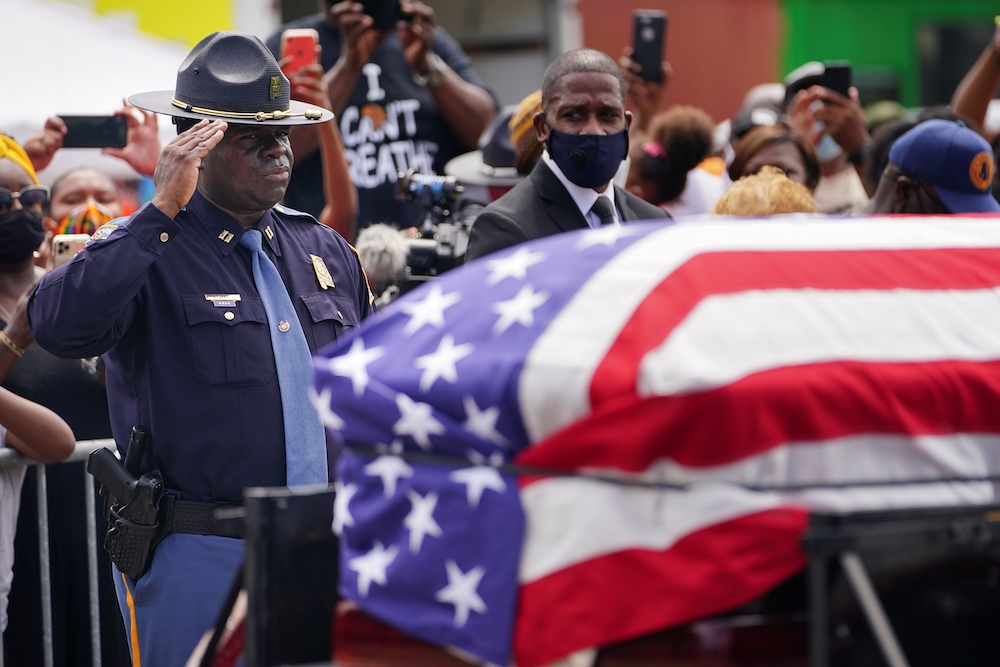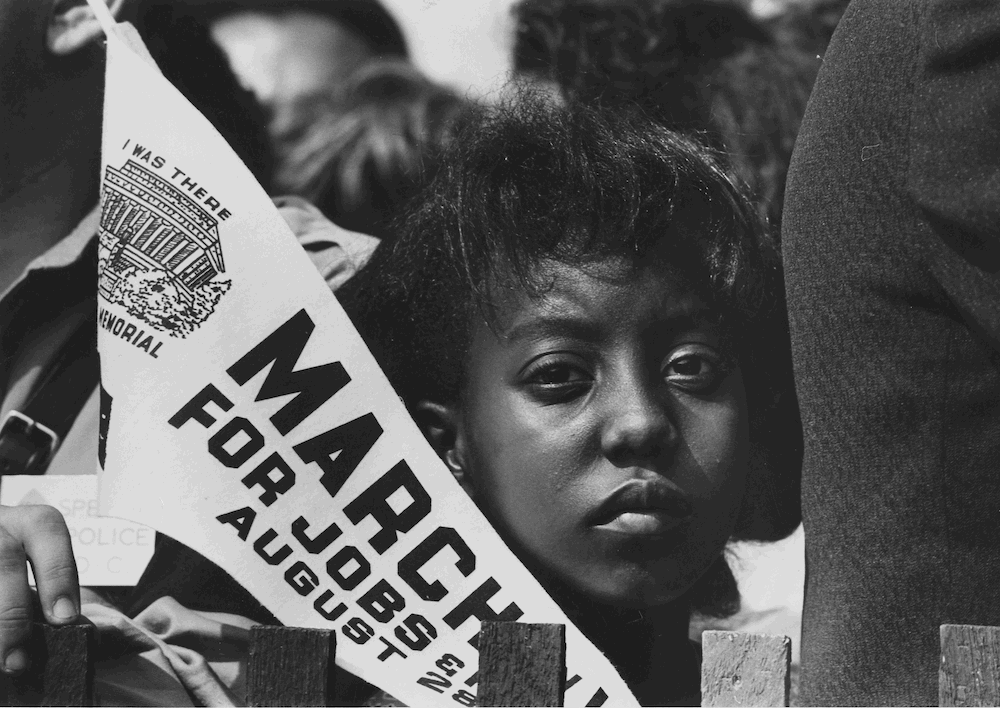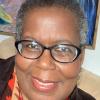
An Alabama State Trooper salutes the casket carrying the late Rep. John Lewis, D-Ga., after it was carried across the Edmund Pettus Bridge in a horse-drawn carriage in Selma, Alabama, July 26. The civil rights movement legend who was a colleague of the Rev. Martin Luther King Jr. died July 17. He was 80. (CNS/Reuters/Elijah Nouvelage)
Three generations of my family entered the Catholic Church in Dothan and Ozark, two racially segregated towns in southeast Alabama, in the early 1960s.
My parents, Thomas and Alma, agreeing on their personal responsibility for the spiritual development of my siblings and me, left their church because of the pastor's abuse of authority. In time, they were led to and welcomed into St. Columba, my hometown's only parish. We became very involved in the life of the parish, and my parents assumed leadership positions. Both priests, Fr. John O'Hara and Fr. Andrew Stauter, made social visits to our home.
It would be decades later through Jack Jezreel's JustFaith that I understood my family's welcome to be an expression of Catholic social justice.
While there were very few parishioners of color growing up, I knew that my faith community was larger than my local parish. This was highlighted annually when news reports covered Pope Paul VI celebrating the Midnight Mass of Christmas, and the Easter Vigil. Each time, the camera would scan across those gathered, I would see countless Black faces. As a child in a Black body, I knew my faith was bigger than the dynamics of white body supremacy that dominated life in Alabama and the United States.
Less than 30 miles away, my aunt, Florine, and my paternal grandparents, Thomas Sr. and Flora, became Catholic. They attended their town's only parish, St. John, where decades later, as an adult, I came to know the beloved priest who had welcomed and accompanied them, Fr. Patrick Maher. In 1954, Maher was ordained in Ireland. After his ordination, he arrived to what was then the Diocese of Mobile-Birmingham. His first assignment was as the assistant pastor at St. Jude's, Montgomery's African-American Catholic community. Fr. Maher's time at St. Jude's began one year before the Rev. Dr. Martin Luther King Jr.'s arrival as the new pastor of Montgomery's Dexter Avenue Baptist Church.
Advertisement
Maher told me that this was where he came to know and love Black people. It was the only time during his six decades as a priest that he cried upon the ending of an assignment. When I asked about the yearlong Montgomery bus boycott that began in 1955, he said that he had provided transportation for those who had previously depended on bus service. He then added, "I should have done more."
At this time in my life, his words are among the catalysts inspiring me to speak the truth of my lived experience as a woman who is both African American and Catholic.
My faith journey has been influenced by the clergy and women religious — though they were few and far between — who marched in the civil rights movement, as well as those today like Fr. Bryan Massingale and Sr. Patricia Chappell, who speak the truth of the Gospel of Christ and challenge us as church — ordained and laity — to address the grave sin of systemic white body supremacy and to facilitate racial healing in our parishes, our schools, our chanceries, our nation and our hearts.
Today, decades after the civil rights movement, I often wonder how I would have participated during that time if I had not been a young child. Would I have used the water fountain exclusively for white bodies? Would I have spat upon those who sought to integrate lunch counters? Would I have marched or found some other way to challenge the status quo? Would I have burned a cross in someone's yard or bombed their home? Would I have risked my life by registering myself and other African Americans to vote and then transporting us to the polls? Would I have shielded Fannie Lou Hamer or John Lewis from a brutal beating?
Growing up during the civil rights era taught me to internalize as a Catholic that the moral arc of the universe bends toward justice, and as faithful citizens we must always discern and respond to the promptings of the Spirit. Today, the Spirit moves among anti-racism efforts all around the world, from the United States to Nigeria. It challenges us ask ourselves what our role will be in justice efforts.

A young woman at the March on Washington for Jobs and Freedom holds a commemorative banner Aug. 28, 1963. (National Archives/U.S. Information Agency, Press and Publications Service/Rowland Scherman)
The murders of Ahmaud Arbery, George Floyd, Breonna Taylor and others amidst the highly racialized climate of this era have triggered a visceral response in my body previously experienced only as a child during the civil rights movement. The traumatic violence of white body supremacy spawned a tension in my Black body inextricably linked to the hunger of freedom inherited from a lineage of ancestors kidnapped in West Africa before surviving the Middle Passage, chattel slavery and Jim Crow.
The cries of kidnapped Africans against injustice are transcending time and space to become the demands of the Black Lives Matter movement. Freedom is never the work of a single individual or one organization. This is the work of each of us, individually and collectively, as Catholics, regardless of body color or parish size, to live out our baptismal call to reject Satan and his empty promises of white body supremacy.
As an African American Catholic, it is extremely disturbing that this is not apparent to all members of the church in this nation.
This year has been challenging, but it is also an opportunity for a kairos moment for those guided through discernment and by wisdom to faithfully and courageously address the many injustices that plague our society, and our church.
How will you respond to this kairos moment?
My hope is that you will choose to do more, now, on this day, because the Gospel of Christ affirms that Black lives do matter.
[Leslye Colvin is a writer, contemplative activist and social commentator. She is a graduate of the Living School for Action and Contemplation and writes from her African-American Catholic heart at Leslye's Labyrinth.]








